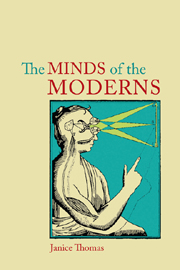Book contents
- Frontmatter
- Contents
- Acknowledgements
- Abbreviations
- Introduction
- I Descartes
- 1 Does Descartes think minds are substances?
- 2 Descartes on self-knowledge
- 3 Human consciousness and the rational soul
- 4 Mental causation
- 5 Mental representation
- II Spinoza
- III Leibniz
- IV Locke
- V Berkeley
- VI Hume
- Conclusion
- Bibliography
- Index
1 - Does Descartes think minds are substances?
from I - Descartes
- Frontmatter
- Contents
- Acknowledgements
- Abbreviations
- Introduction
- I Descartes
- 1 Does Descartes think minds are substances?
- 2 Descartes on self-knowledge
- 3 Human consciousness and the rational soul
- 4 Mental causation
- 5 Mental representation
- II Spinoza
- III Leibniz
- IV Locke
- V Berkeley
- VI Hume
- Conclusion
- Bibliography
- Index
Summary
Why start an essay devoted to Descartes's theory of mind with the question whether Descartes thinks human minds are substances or not? Doesn't everyone know that Descartes is a mind-body dualist who thinks that minds are things that are utterly metaphysically different from material bodies? Surely there is no question of deciding – getting on for four hundred years after the publication of the Meditations – that Descartes was not a dualist after all?
However, recently a number of commentators have seriously questioned the attribution to Descartes of the sort of black and white, unqualified mind–body substance dualism that Gilbert Ryle captured in his famous expression “the ghost in the machine”. For, among other things, such a dualism seems to make the explanation of mind-body interaction impossible and is therefore frequently put up as a hopeless and naive view to be demolished by beginners cutting their teeth in the study of philosophy of mind. Yet Descartes appears not to have worried overly about the problem of interaction. Could it really be right to see “the father of modern philosophy” as stumbling unwittingly into irremediable error in his account of the nature of mind and the self?
The answer to this conundrum, as might be expected, is complicated. Yes, Descartes is of course some sort of substance dualist: in the Meditations and elsewhere Descartes presents arguments to support the view that what he calls “the mind” (or, as he dubs it sometimes, “the rational soul” is an intellectual substance distinct from the body.
- Type
- Chapter
- Information
- The Minds of the ModernsRationalism, Empiricism and Philosophy of Mind, pp. 12 - 20Publisher: Acumen PublishingPrint publication year: 2009

